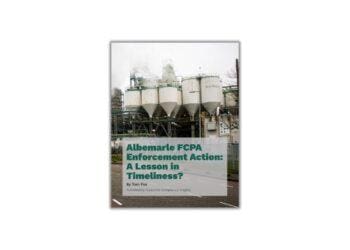This article was republished with permission from Michael Volkov’s blog, Corruption, Crime & Compliance.
I have a lot of pet peeves, especially when it comes to lawyers and compliance professionals. Do not worry: this is a not a column about all of my pet peeves; I would never bore you with all those issues.
My current pet peeve in the compliance field is the expression “compliance fatigue.” I am not a paranoid person, but anyone who claims that his or her organization suffers from “compliance fatigue” is misguided and on someone’s payroll. The problem is, I cannot figure out who is pushing this concept and why.
I am sure there are plenty of constituencies in corporate organizations who are jealous of or threatened by the elevation of an independent and empowered ethics and compliance function. It is easy to cite in-house lawyers as a possible source for such opposition, but that is way too simplistic and convenient. In fact, most in-house lawyers support the ethics and compliance function and see the CCO as an important ally in the overall ability of a company to avoid legal problems.
The companies that complain about compliance fatigue are usually companies that are suffering from tight financial conditions or senior managers who are overly concerned about the amount of money being spent on compliance. The bean counters who control the company’s purse strings are strong suspects for promoting this unfortunate concept.
Compliance programs are securing increased funding, but not at some extraordinary level. Nor is compliance spending draining any company of much needed resources for vital business functions. In fact, compliance spending is almost always cut so that important sales, marketing or business development projects can continue. Senior executives always promote these functions to the detriment or other “non-revenue contributing” functions.
Company leaders are still not getting the message – an ethics and compliance program is not critical to just prevent a company from getting into trouble – ethics and compliance contributes to a company’s sustainability and overall financial performance. Business leaders continue to suffer from narrow, quarterly driven financial data and fail to live in a longer-term world where corporate performance has to be sustained. A strong ethical culture is vital to promoting and ensuring the long-term sustainability of a company.
Money spent on ethics and compliance is money well spent. Compliance fatigue is a misnomer if ever there was one in the ethics and compliance field. In my view, there is no such thing as compliance fatigue, especially in today’s world where risks have multiplied and government enforcement is at record levels.
In the overall scheme of things, compliance spending is a drop in the bucket. Corporate leaders who have advanced their education and understanding of governance principles know that the old days of trade-offs between business and compliance spending is an outdated and irrelevant model. Ethics and compliance contributes to the bottom line of a company.
A CCO has to take on the compliance “fatigue” issue and counter such an idea by demonstrating the positive benefits of ethics and compliance. In addition, the CCO has to explain that opponents of a robust ethics and compliance program ignore the fact that this attitude reflects the rapid growth in the compliance function. It is important to emphasize that the most important development in corporate governance in the last 10 years has been the risk of ethics and compliance functions within corporate operations.
In the end, we can only hope that compliance fatigue will be relegated to ash heap of forgotten terminology that reflects little in the real world. Companies are now committed to the ethics and compliance function or else they face real and tangible perils from government regulators, shareholders and other important stakeholders.



 Michael Volkov is the CEO of The Volkov Law Group LLC, where he provides compliance, internal investigation and white collar defense services. He can be reached at
Michael Volkov is the CEO of The Volkov Law Group LLC, where he provides compliance, internal investigation and white collar defense services. He can be reached at 






